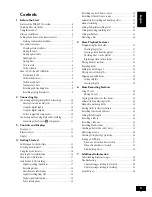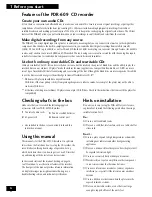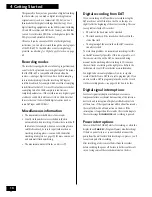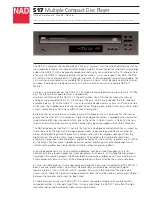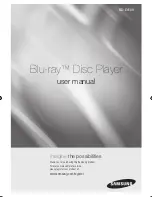
11
En
2 Connecting up
English
POWER-CORD CAUTION
Handle the power cord by the plug part. Do not pull out the
plug by tugging the cord, and never touch the power cord
when your hands are wet, as this could cause a short circuit or
electric shock. Do not place the unit, a piece of furniture, or
other object on the power cord or pinch the cord in any other
way. Never make a knot in the cord or tie it with other cords.
The power cords should be routed so that they are not likely to
be stepped on. A damaged power cord can cause a fire or give
you an electric shock. Check the power cord once in a while.
When you find it damaged, ask your nearest Pioneer
authorized service center or your dealer for a replacement.
OUT
CONTROL
INPUT
OUTPUT
PLAY
REC
L
R
MD/TAPE
LINE
IN
DIGITAL IN
OPTICAL
COAXIAL
OPTICAL
COAXIAL
DIGITAL OUT
TEXT
CONTROL
AC IN
IN
REC
OUT
PLAY
L
R
L
R
L
R
L
R
L
R
Connecting up for analog
playback & recording
Before you start, make sure that all the components are
switched off and disconnected from the wall outlet.
Next, connect this unit to your amplifier/receiver using the
two sets of supplied audio leads—one set for playback, the
other for recording. On the rear panel of your amplifier find
an unused set of inputs/outputs for a tape/md recorder (check
the instruction manual that came with your amplifier if
you’re unsure about which terminals to use).
Using this set up you can make recordings from any other
component connected to the amplifier, via the analog inputs
of this unit.
Connecting other Pioneer
Î
components
If you are using a Pioneer amplifier or receiver that has this
feature, you can control this unit with the multi-remote
controller that came with your amplifier/receiver. The
advantage of this is that you can use a single remote control
to operate several components. Check the instruction manual
that came with your amplifier or receiver for more informa-
tion on using its remote as a multi-controller.
Use a commercially available cord with a mono mini-plug at
either end to connect the
CONTROL
OUT
terminal of the
amplifier/receiver to the
CONTROL
IN
terminal of this unit.
Note:
Make sure that at least one set of analog terminals is
connected to the amplifier when using
Î
control cords.





